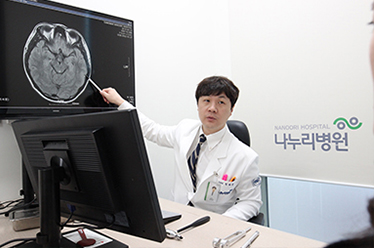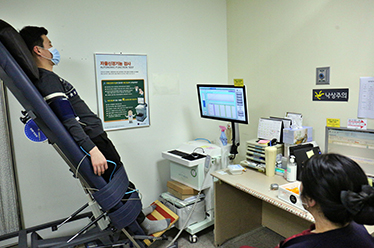At Nanuri Hospital's Cranial Nerve Center, neurologists accurately diagnose and treat diseases that occur in the central nervous system including the brain and spinal cord, and the peripheral nervous system including cranial nerves, peripheral nerves, and muscles.
Dizziness is one of the symptoms that the most patients appeal in addition to headache. Most dizziness symptoms improve with rest or over time, but in some cases, repeated dizziness can adversely affect daily life.
Dizziness is largely divided into 'Peripheral Vertigo' caused by problems in the ear and 'Central Vertigo' caused by problems in the brain. In case of ‘Peripheral Vertigo’, symptoms often get better naturally, but 'Central Vertigo' is related to brain diseases such as stroke and brain tumor, so it is important to find out the cause through medical examination. In addition, abnormalities in the autonomic nervous system may cause dizziness.
| Peripheral Vertigo | Benign Paroxysmal Positional Vertigo (Otolithiasis): Dizziness caused by problems with the semicircular canals and otoliths (small stones that help maintain a sense of equilibrium) Vestibular Neuritis: Dizziness caused by inflammation of the vestibular nerve involved in equilibrium Meniere's disease: Dizziness caused by swelling of the endolymphatic duct due to endolymphatic hydrops in the endolymphatic duct |
| Central Vertigo | Dizziness caused by structural and functional abnormalities of the brain |
| Abnormalities in the autonomic nervous system | Orthostatic vertigo, orthostatic hypotension, or orthostatic tachycardia syndrome caused by abnormal autonomic nerve function |
Through MRI, Autonomic Testing, Vestibular Function Test (eye movement test), etc., the cause of dizziness is identified and appropriate treatment is suggested. In the case of otolithiasis, dizziness can be improved through the Epley maneuver, and in the case of vestibular neuritis, dizziness is treated through appropriate drugs and vestibular rehabilitation.
 [Brain MRI test and clinical diagnosis] |
 [Autonomic Testing] |
 [Vestibular Function Tests] |
Brain MRI Scan
This is a test to diagnose abnormalities in brain tissue and blood vessels. Compared to CT scans, the resolution is better, so the location of brain lesions and blood vessel conditions can be clearly identified.
Autonomic Testing
Examine abnormalities of the autonomic nervous system. It checks the pulse and blood pressure in various states such as lying down and standing up to check changes in heart rate and blood pressure.
Vestibular Function Tests
This is a test that observes minute eye movements with glasses equipped with an infrared camera. All of them can be tested, including otolithiasis, peripheral vertigo, and central vertigo.
